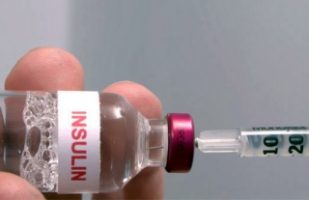- Home
- Editorial
- News
- Practice Guidelines
- Anesthesiology Guidelines
- Cancer Guidelines
- Cardiac Sciences Guidelines
- Critical Care Guidelines
- Dentistry Guidelines
- Dermatology Guidelines
- Diabetes and Endo Guidelines
- Diagnostics Guidelines
- ENT Guidelines
- Featured Practice Guidelines
- Gastroenterology Guidelines
- Geriatrics Guidelines
- Medicine Guidelines
- Nephrology Guidelines
- Neurosciences Guidelines
- Obs and Gynae Guidelines
- Ophthalmology Guidelines
- Orthopaedics Guidelines
- Paediatrics Guidelines
- Psychiatry Guidelines
- Pulmonology Guidelines
- Radiology Guidelines
- Surgery Guidelines
- Urology Guidelines
Doxycycline for treating Insulin Resistance in Overweight and Obese Individuals

Dr. Erjola Balliu, of Stony Brook Hospital in New York, in the annual meeting of the Endocrine Society (ENDO 2017) recently reported finding of a double-blind, placebo-controlled proof-of-concept study that use of the antibiotic doxycycline was associated with improved fasting glucose as compared to placebo.
According to her, 68.5 % of the adult population in the United States were overweight or obese and the incidence of diabetes had increased by 15% and hypertension by 10% over the last 10 years. It was imperative to find therapies to curtail this epidemic. It is now known that obesity is a state of inflammation which may be contributing to the development of insulin resistance and the associated metabolic abnormalities such as dyslipidemia, diabetes, hypertension, and cardiovascular disease.It is therefore logical to look at medications with an aim to reduce inflammation to combat obesity and insulin resistance.In the past Pioglitazone,Metformin and even Aspirin have been used for increasing insulin sensitivity but could not be continued on long term basis because of adverse effects.
The aim of this proof-of-concept study is to assess the pleiotropic effects of sub-microbial doses of doxycycline, including both reductions in inflammation and levels of matrix metalloproteinases, resulting in improvement in insulin resistance and hypertension.
Dr.Erjola Balliu et al conducted a 12 week, randomized, double-blind, placebo-controlled proof-of-concept study. The primary outcome variable was the change in insulin sensitivity from pre- to post- treatment in the group taking doxycycline compared to the group taking placebo. Insulin sensitivity was assessed with both HOMA and the area under the curve for c-peptide during an OGTT. The secondary outcome variable was improvement in hypertension, determined by changes in central aortic pressure and arterial stiffness. In addition, the proposed study also assessed a reduction in inflammatory markers (e.g. CRP, IL6 and sTNFR2) and a reduction in circulating matrix
metalloproteinases.
The data presented confined to preliminary results on glucose metabolism only. In the study a > -5% change in fasting glucose, > -10% change in glucose AUC after OGTT and >- 2% change in HbA1c were arbitrarily chosen as significant. Fourteen subjects completed the protocol and four subjects withdrew from the study for personal conflicts. A reduction in fasting glucose and glucose AUC after a 75-g OGTT was seen in 6 subjects. Five subjects had a reduction in their HbA1c, but one of them also had unintentional weight loss of 19.2 pounds so it was not clear whether the reduction in HbA1c was from weight loss or study drug. Only 3 subjects had reduction in glycemia assessed by all 3 parameters fasting glucose, post glucose load and HbA1c. Since it was a blind study , it was not known which of these subjects received doxycycline or placebo.
The researchers speculated that the 6 subjects that improved the glycemic index by at least 2 of the 3 parameters measured could be on the doxycycline arm. These results could have enormous implications for improving the health of these at-risk individuals by retarding the progression to overt diabetes and cardiovascular disease.
For more details click on the link : http://www.endocrine.org/meetings/endo-annual-meetings/abstract-details?ID=30069

Disclaimer: This site is primarily intended for healthcare professionals. Any content/information on this website does not replace the advice of medical and/or health professionals and should not be construed as medical/diagnostic advice/endorsement or prescription. Use of this site is subject to our terms of use, privacy policy, advertisement policy. © 2020 Minerva Medical Treatment Pvt Ltd